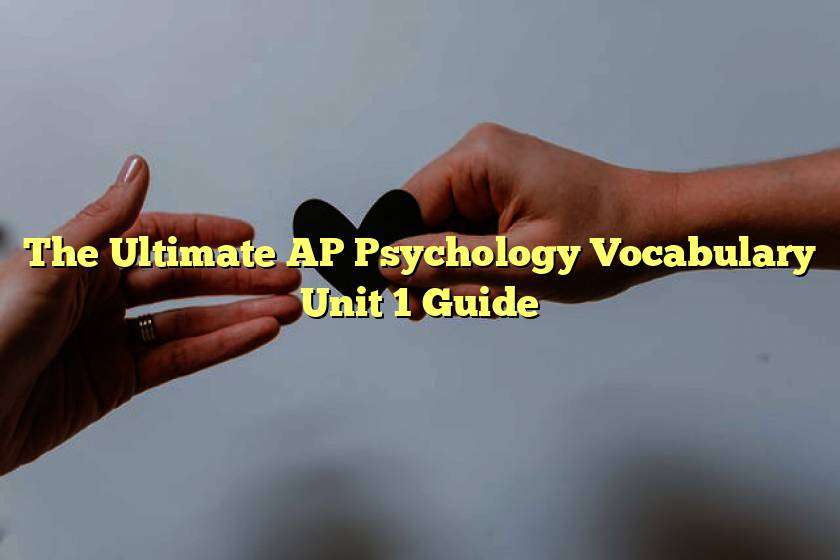Are you preparing for the AP Psychology exam and feeling overwhelmed by the extensive vocabulary? Worry not, as we have the ultimate guide for you to excel in Unit 1 and beyond. In this article, we will cover all the essential terms and concepts of Unit 1, along with a detailed explanation of each one of them.
Introduction to Psychology
Psychology is the scientific study of behavior and mental processes. It is one of the most exciting and interdisciplinary fields, drawing principles from biology, philosophy, anthropology, and sociology. Psychologists are concerned with understanding human and animal behavior, emotions, decision-making, attitudes, and perceptions. The study of psychology can be divided into various subfields, such as social psychology, cognitive psychology, developmental psychology, and clinical psychology.
Research Methods in Psychology
To study psychological phenomena, psychologists employ different methods based on the type of research question and hypothesis. The most common research methods in psychology are as follows:
1. Naturalistic Observation
Naturalistic observation involves observing people and their behavior in a natural setting, without any interference or manipulation. Researchers record the behavior and analyze it later to draw inferences about the underlying psychological processes.
2. Case Study
A case study is an in-depth analysis of an individual, group, or situation. Researchers collect data using various methods, such as interviews, questionnaires, and observations, to understand the behavior and mental processes of the subject.
3. Survey
A survey is a set of questions administered to a group of people to collect data on their attitudes, beliefs, and opinions. Researchers use surveys to infer the prevalence or incidence of a particular behavior or psychological phenomenon.
4. Experiment
An experiment is a controlled study in which the researcher manipulates a variable to observe its effect on another variable. Researchers use experiments to establish cause-and-effect relationships between variables.
5. Correlational Research
Correlational research examines the relationship between two or more variables. Researchers use correlational research to understand the degree and direction of the relationship between two variables. However, correlational research does not establish causality.
Key Theories of Psychology
Psychologists have proposed several theoretical frameworks to explain behavior and mental processes. Here are some of the key theories of psychology:
1. Psychodynamic Theory
Psychodynamic theory emphasizes the role of unconscious thoughts, desires, and conflicts in shaping behavior. According to this theory, people are motivated by unconscious drives, such as the desire for sex, power, or achievement.
2. Behavioral Theory
Behavioral theory posits that behavior is shaped by the environment and experiences. According to this theory, people learn new behaviors through environmental cues and reinforcements.
3. Humanistic Theory
Humanistic theory emphasizes the inherent goodness and potential of individuals. According to this theory, people have an innate drive towards self-actualization, or the realization of their full potential.
4. Cognitive Theory
Cognitive theory focuses on the mental processes involved in perception, memory, problem-solving, and decision-making. According to this theory, people are active processors of information, using their mental models to make sense of the world.
Conclusion
In conclusion, Unit 1 of AP Psychology covers the foundational concepts, theories, and methods used in the study of psychology. By mastering these concepts, you will be well-equipped to understand the rest of the course material and excel in the AP Psychology exam. We hope that this guide has been helpful in clarifying the essential vocabulary of Unit 1. Happy studying!



